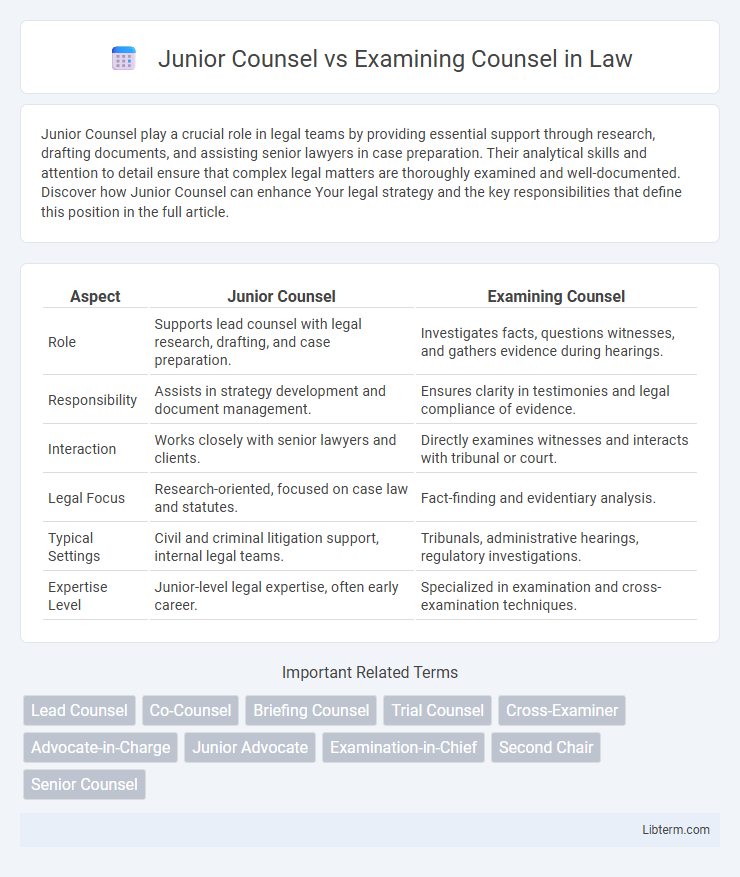Junior Counsel play a crucial role in legal teams by providing essential support through research, drafting documents, and assisting senior lawyers in case preparation. Their analytical skills and attention to detail ensure that complex legal matters are thoroughly examined and well-documented. Discover how Junior Counsel can enhance Your legal strategy and the key responsibilities that define this position in the full article.
Table of Comparison
| Aspect | Junior Counsel | Examining Counsel |
|---|---|---|
| Role | Supports lead counsel with legal research, drafting, and case preparation. | Investigates facts, questions witnesses, and gathers evidence during hearings. |
| Responsibility | Assists in strategy development and document management. | Ensures clarity in testimonies and legal compliance of evidence. |
| Interaction | Works closely with senior lawyers and clients. | Directly examines witnesses and interacts with tribunal or court. |
| Legal Focus | Research-oriented, focused on case law and statutes. | Fact-finding and evidentiary analysis. |
| Typical Settings | Civil and criminal litigation support, internal legal teams. | Tribunals, administrative hearings, regulatory investigations. |
| Expertise Level | Junior-level legal expertise, often early career. | Specialized in examination and cross-examination techniques. |
Overview of Junior Counsel and Examining Counsel Roles
Junior Counsel supports lead attorneys by conducting legal research, drafting documents, and assisting in case preparation to ensure comprehensive representation. Examining Counsel specializes in scrutinizing evidence, questioning witnesses, and analyzing facts to identify inconsistencies and strengthen case arguments. Both roles are critical in litigation, with Junior Counsel providing foundational legal work and Examining Counsel focusing on detailed examination and trial preparation.
Key Responsibilities of Junior Counsel
Junior Counsel primarily conduct detailed legal research and prepare case briefs to support the senior Examining Counsel. They manage the compilation and organization of evidence, ensuring all documentation is compliant with procedural standards. Their role involves drafting initial legal arguments and providing strategic recommendations during case evaluations under the guidance of Examining Counsel.
Main Duties of Examining Counsel
Examining Counsel primarily focuses on evaluating patent applications by conducting detailed prior art searches, analyzing patent claims for originality and compliance, and communicating with applicants regarding necessary amendments or rejections. They ensure that patent filings meet the legal requirements and maintain consistency with patent laws and regulations throughout the examination process. Their duties are crucial to maintaining patent quality and preventing the issuance of invalid or overly broad patents.
Qualifications and Required Skills
Junior Counsel typically possesses foundational legal qualifications such as an LLB degree and admission to the bar, alongside strong research and drafting skills essential for supporting senior counsels. Examining Counsel usually requires more advanced experience, often having worked as Junior Counsel, with expertise in case analysis, procedural knowledge, and the ability to question witnesses effectively during trials. Both roles demand excellent legal reasoning and communication skills, but Examining Counsel must exhibit greater proficiency in courtroom advocacy and strategic case management.
Work Environment and Typical Cases
Junior Counsel often works within structured legal teams, providing support to senior lawyers in a collaborative office setting, handling preliminary case research, drafting documents, and assisting in client communication. Examining Counsel typically operates in regulatory or patent offices, focusing on evaluating legal compliance or patent applications, requiring a detail-oriented and independent work environment with extensive case analysis of intellectual property or administrative law issues. Both roles involve interaction with case law and statutory regulations, but Junior Counsel's work is more client and litigation-driven, whereas Examining Counsel's tasks center around examination and enforcement of legal standards.
Career Progression and Opportunities
Junior Counsel often begins their career handling research, drafting documents, and assisting senior lawyers, gaining essential courtroom experience and building foundational legal skills. Examining Counsel typically holds a more senior position, responsible for conducting examinations, presenting arguments, and leading case strategies, which enhances leadership capabilities and courtroom presence. Career progression from Junior Counsel to Examining Counsel offers opportunities for increased responsibility, specialization, and higher-profile case involvement, paving the way for senior legal roles such as Senior Counsel or partner positions.
Collaboration with Senior Counsel
Junior Counsel collaborates closely with Senior Counsel by supporting case preparation, conducting detailed legal research, and drafting documents to strengthen the legal strategy. Examining Counsel works alongside Senior Counsel by analyzing evidence, formulating examination plans, and questioning witnesses to ensure rigorous fact-finding. Both roles require seamless communication and coordination with Senior Counsel to enhance case outcomes and uphold courtroom efficiency.
Differences in Courtroom Involvement
Junior Counsel primarily supports lead counsel by managing case preparation and limited courtroom tasks, while Examining Counsel actively participates in examining witnesses and presenting evidence. Junior Counsel's involvement in questioning is typically restricted or supervised, whereas Examining Counsel leads direct examinations and cross-examinations, shaping the trial's evidentiary narrative. The distinction in courtroom roles reflects differing levels of responsibility and authority in litigation proceedings.
Remuneration and Job Outlook
Junior Counsel typically receive lower remuneration compared to Examining Counsel due to their more limited experience and scope of responsibilities, with salaries varying widely based on jurisdiction and firm size. Examining Counsel often command higher pay reflecting their specialized expertise in patent prosecution and complex legal analysis within intellectual property law. The job outlook for both roles remains stable, driven by growing demand for patent services, but Examining Counsel positions may offer greater advancement opportunities and salary growth in competitive markets.
Choosing Between Junior and Examining Counsel Paths
Choosing between Junior Counsel and Examining Counsel primarily depends on career goals within the legal or patent field. Junior Counsel often handles in-depth case preparations and supports senior counsel, ideal for gaining extensive litigation or advisory experience. Examining Counsel focuses on patent examination and prosecution, suited for those aiming to specialize in intellectual property law and procedural expertise.
Junior Counsel Infographic

 libterm.com
libterm.com